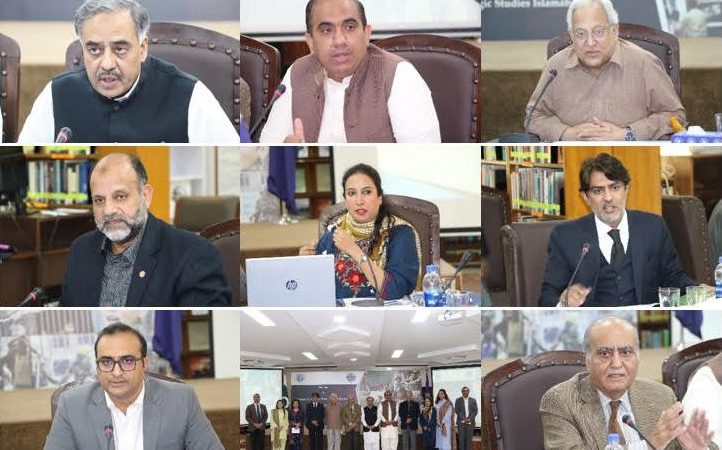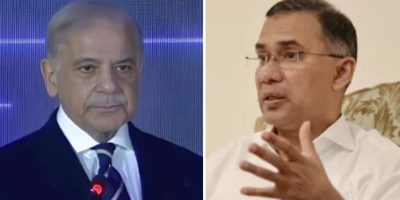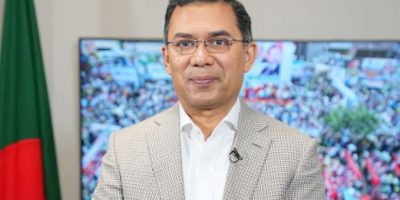ISSI holds Seminar titled “October 27, 1947: A Black Day for Humanity”

ISLAMABAD, OCT 27 /DNA/ – The India Study Centre (ISC) at the Institute of Strategic Studies Islamabad (ISSI) organized a seminar today, titled “October 27, 1947: A Black Day for Humanity.” Dr. Khurram Abbas, Director ISC in his introductory remarks highlighted the significance of this day and the importance of mobilizing the international community to advance the Kashmir cause. Other participants included: Dr. Maria Saifuddin Effendi, Assistant Professor Department of Peace and Conflict Studies, NDU; Mr. Imran Shafiq, Advocate Supreme Court of Pakistan and International Law Expert; Ambassador Syed Ishtiaq Hussain Andrabi, former Ambassador of Pakistan; Mr. Mehmood Ahmed Saghar, Convener APHC; and Mr. Ilyas Mehmood Nizami, DG South Asia and SAARC at Ministry of Foreign Affairs.
Director General ISSI Ambassador Sohail Mahmood, in his remarks, welcomed the guests and highlighted the legal, human rights, and peace and security aspects of the Jammu and Kashmir dispute. He underlined that, on 27 October 1947, the darkest chapter in Kashmir’s history commenced when Indian forces illegally landed in Srinagar on the basis of the so-called ‘instrument of accession’ that has been proven, through meticulous research, to be fraudulent. While maintaining its illegal occupation, India continues to willfully defy the UN charter and United Nations Security Council resolutions. Ambassador Sohail Mahmood stressed that torture, extrajudicial killings, and collective punishment were being carried out by the occupying forces with impunity; also a demographic change was being effected in the occupied territory in violation of international law, particularly the 4th Geneva Convention.
In terms of further steps, Ambassador Sohail Mahmood suggested proactive and sustained diplomatic outreach; efforts in the legal domain to challenge the illegal Indian measures; including demographic changes; documentation of all human rights abuses to be conveyed to the United Nations human rights machinery; and continuous engagement with the United Nations Security Council to apprise the international community of the threat to international peace and security. Last but not the least, he said, the government of Pakistan should appropriately recognize the extensive work of eminent scholar Alastair Lamb on the Kashmir dispute.
Other discussants highlighted the historical background and the current dynamics of the Kashmir dispute. Dr. Effendi stated that the human rights aspect of the issue did not start from 1947; rather the Kashmiris have been under suppression since 1846 when the Treaty of Amritsar was signed. First under the Dogra Raj and now under India’s illegal occupation, IIOJK was facing atrocities being perpetrated by the occupying forces. The Indian government aimed to ‘Hinduize’ Kashmir, which placed heavy responsibility on the international community to raise its voice against such illegal actions. She proposed highlighting the Kashmir cause within three frameworks: UN Genocide Convention, structural violence, and right of self-determination.
Advocate Imran Shafiq drew parallel between India’s illegal actions and violation of international law by Indian forces. He called upon the international community to ensure implementation of the UNSC resolutions providing for as plebiscite, and particularly Resolution 122 of 1957 that nullified any action taken by the so-called constituent assembly in Occupied Jammu and Kashmir and forbade any demographic change.
Ambassador Andrabi extensively discussed about the historical dynamics of ‘instrument of accession.’ He addressed how India had maliciously indulged in Jammu and Kashmir at the time of the partition and had contacted all the stakeholders who were experienced in forcefully controlling the princely states.
Acknowledging the historical struggle of Kashmiris, Mr. Saghar highlighted the most-neglected Jammu Massacre in 1947 in which 250,000 Muslims were killed by Dogra Raj. He stressed the importance of forceful advocacy of the Kashmir cause, with the fullest backing of the entire political spectrum.
Mr. Nizami also shed light on the human rights, international law, and peace and security aspect of the Kashmir dispute. He stated that while UN affirms self-determination of Kashmiris, there is an imperative need to implement UNSC resolutions. He noted Pakistan’s continuous efforts to advocate the rights of the Kashmiris and added that peace in the region must be the topmost priority for all. Pakistan should work along with the UN to pressure India to release all political prisoners, repeal all draconian laws, allow the safe access of International Organizations to the valley, and implement the UN Security Council resolutions.
The Chairman BoG Ambassador Khalid Mahmood made concluding remarks, affirming Pakistan’s all-out support to the Kashmiris until the dispute is justly resolved.
Related News

Premier Shehbaz invites Bangladesh PM hopeful to Pakistan, vows stronger ties
ISLAMABAD, FEB 13: Prime Minister Shehbaz Sharif on Friday invited Bangladesh Nationalist Party (BNP) chairmanRead More

PM Shehbaz greets BNP chief on election victory
ISLAMABAD, FEB 13: /DNA/ – Prime Minister Muhammad Shehbaz Sharif spoke with Mr. Tarique Rahman,Read More


Comments are Closed